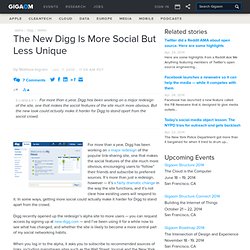

Can Digg Apologize Its Way Back to Popularity?: Tech News « It’s hard not to feel sorry for new Digg CEO Matt Williams.
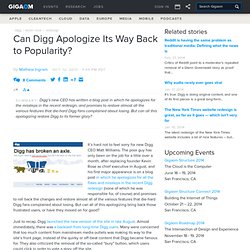
The poor guy has only been on the job for a little over a month, after replacing founder Kevin Rose as chief executive in August, and his first major appearance is on a blog post in which he apologizes for all the flaws and missteps in the recent Digg redesign (none of which he was responsible for, of course) and promises to roll back the changes and restore almost all of the various features that die-hard Digg fans complained about losing.
But can all of this apologizing bring back those frustrated users, or have they moved on for good? Just to recap, Digg launched the new version of the site in late August. Almost immediately, there was a backlash from long-time Digg users. Many were concerned that too much content from mainstream media outlets was making its way to the site’s front page, instead of the quirky or off-beat content that Digg became famous for. Related content from GigaOM Pro (sub req’d): Kevin Rose: Digg Turned Down $80 Million Acquisition Offer. Digg Redesign Tanks Traffic: Down 26% The launch of Digg's redesign will likely go down in the history of social media as a textbook example for how to alienate your users.
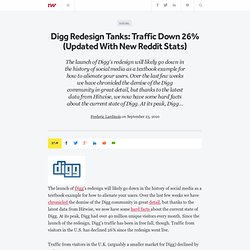
Over the last few weeks we have chronicled the demise of the Digg community in great detail, but thanks to the latest data from Hitwise, we now have some hard facts about the current state of Digg. At its peak, Digg had over 40 million unique visitors every month. Since the launch of the redesign, Digg's traffic has been in free fall, though. Traffic from visitors in the U.S. has declined 26% since the redesign went live.
Traffic from visitors in the U.K. Digg Tries to Regain Its Momentum. Kevin Rose Responds To Digg Criticism On Diggnation, Mostly Tells Users To Chill. Digg founder Kevin Rose cheerfully responds to the mountains of criticism around the newly launched Digg 4.
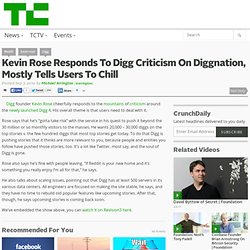
His overall theme is that users need to deal with it. Rose says that he’s “gotta take risk” with the service in his quest to push it beyond the 30 million or so monthly visitors to the masses. He wants 20,000 – 30,000 diggs on the top stories v. the few hundred diggs that most top stories get today. To do that Digg is pushing stories that it thinks are more relevant to you, because people and entities you follow have pushed those stories, too. It’s a lot like Twitter, most say, and the soul of Digg is gone. Rose also says he’s fine with people leaving. He also talks about scaling issues, pointing out that Digg has at least 500 servers in its various data centers. We’ve embedded the show above, you can watch it on Revision3 here. Digg Exec: Sorry About the Bugs, But Glad You Care! « Digg’s had a hectic week.

The company’s long-awaited relaunch didn’t exactly go as planned; it was fraught with technical problems and poorly received by many users. Digg Close to Profits, New CEO Also Just Around the Corner. Digg CEO Kevin Rose Digg will soon announce a new CEO, according to co-founder and current chief executive Kevin Rose, who admits he’s not really a good fit for the job, calling the task of managing the startup’s 80-person staff “a nightmare” in a video interview with All Things Digital (full version embedded below).
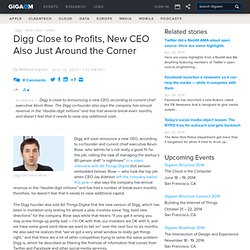
Rose — who took the top job when CEO Jay Adelson left the company earlier this year — also says the company has annual revenue in the “double-digit millions” and has had a number of break-even months; therefore, he doesn’t feel that it needs to raise additional capital. The New Digg: What It Means For Power Users & Publishers. The new version of Digg has changed the playing field for two of its biggest constituents: power users and publishers.
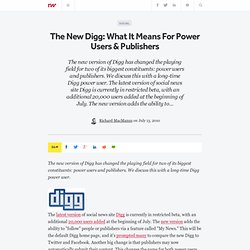
We discuss this with a long-time Digg power user. The latest version of social news site Digg is currently in restricted beta, with an additional 20,000 users added at the beginning of July. Big Changes Are Coming to Digg: More Power to Publishers, Less P. Last night, during Digg's annual SXSW party, Digg's CEO Jay Adelson announced a set of significant changes to Digg.

Among the changes Adelson announced are a streamlined submission process, a personalized homepage, an unlimited amount of topic pages, a new commenting system and better curation tools. Earlier this morning, we got a chance to sit down with Adelson to discuss these changes in greater detail. Digg Cuts Staff by 10% (Again) Digg’s Biggest Problem Is Its Users And Their Constant Opinions. There’s a saying I love: “a camel is a horse designed by committee.”

A variation is “a volvo is a porsche designed by committee.” Some of the best product advice I’ve ever heard goes something like “damn what the users want, charge towards your dream.” All of these statements are, of course, saying the same thing. When there are too many cooks in the kitchen all you get is a mess. And when too many people have product input, you’ve got lots of features but no soul. Product should be a dictatorship.
Digg is sort of on the opposite end of the spectrum The company has been standing still now for years as Facebook, Twitter and others have run laps around it. But now, after seeing hundreds of stories and reading thousands of comments, you’ve made it clear. Digg's New Social Following and Publishing Tools [VIDEO] Digg is Deadd. Advertisement It was a good run, Digg.com.

You certainly had a great idea and funneled plenty of Web traffic to opportunistic and manipulative publishers. Alas, the run is over. And it's not coming back. According to the latest Compete.com data (April, 2010) Digg lost an astounding 13.8 million unique visits from March to April, 2010 -- a near 36 percent drop. The New Digg Is More Social But Less Unique. For more than a year, Digg has been working on a major redesign of the popular link-sharing site, one that makes the social features of the site much more obvious, encouraging users to “follow” their friends and subscribe to preferred sources.
